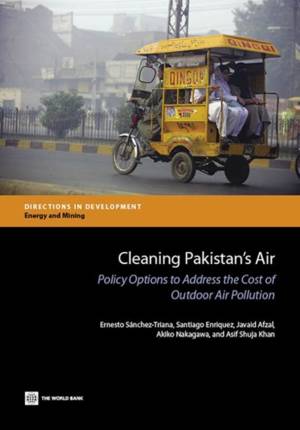
- Retrait gratuit dans votre magasin Club
- 7.000.000 titres dans notre catalogue
- Payer en toute sécurité
- Toujours un magasin près de chez vous
- Retrait gratuit dans votre magasin Club
- 7.000.0000 titres dans notre catalogue
- Payer en toute sécurité
- Toujours un magasin près de chez vous
Cleaning Pakistan's Air
Policy Options to Address the Cost of Outdoor Air Pollution
Ernesto Sánchez-Triana, Santiago Enriquez, Javaid Afzal, Akiko Nakagawa, Asif Shuja Khan
59,45 €
+ 118 points
Description
The extent of urban air pollution in Pakistan--South Asia's most urbanized country--is among the world's most severe, significantly damaging human health, quality of life, and the economy and environment of Pakistan. The harm from Pakistan's urban air pollution is among the highest in South Asia, exceeding several high-profile causes of mortality and morbidity in Pakistan. Improved air quality management (AQM) in Pakistan can have notable economic and health benefits. For example, the estimated health benefits per dollar spent on cleaner diesel are approximately US $1-1.5 for light-duty diesel vehicles and US $1.5-2.4 for large buses and trucks. This report advocates that Pakistan allocate resources to AQM, because its air quality is severely affecting millions of Pakistanis, and because experiences around the world indicate that interventions can significantly improve air quality. This report details a broad spectrum of research on Pakistan's AQM challenges, and identifies a comprehensive set of steps to improve air quality. The research presented here underpins the conclusions that addressing Pakistan's urban air pollution requires coordinated interventions to strengthen AQM, build agencies' institutional capacity, bolster AQM's legal and regulatory framework, implement policy reforms and investments, and fill knowledge gaps. However, Pakistan's policy makers face major obstacles, including limited financial, human, and technical resources, and can pursue only a few AQM interventions at the same time. In the short term, Pakistan's AQM should give highest priority to reducing pollutants linked to high morbidity and mortality: PM2.5 (and precursors like SOx and NOx) from mobile sources. A second-level short-term priority could be PM2.5, SOx, and emissions of toxic metals from stationary sources. An important medium-term priority should be mass transportation in major cities, controlling traffic, and restricting private cars during high-pollution episodes. A long-term priority could be taxing hydrocarbons, based on their contribution to greenhouse gases.
Spécifications
Parties prenantes
- Auteur(s) :
- Editeur:
Contenu
- Nombre de pages :
- 152
- Langue:
- Anglais
- Collection :
Caractéristiques
- EAN:
- 9781464802355
- Date de parution :
- 26-06-14
- Format:
- Livre broché
- Format numérique:
- Trade paperback (VS)
- Dimensions :
- 178 mm x 254 mm
- Poids :
- 367 g

Les avis
Nous publions uniquement les avis qui respectent les conditions requises. Consultez nos conditions pour les avis.






